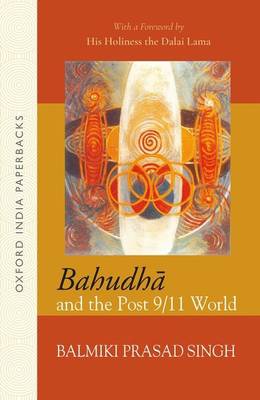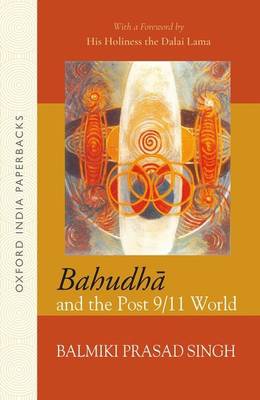
Bedankt voor het vertrouwen het afgelopen jaar! Om jou te bedanken bieden we GRATIS verzending (in België) aan op alles gedurende de hele maand januari.
- Afhalen na 1 uur in een winkel met voorraad
- In januari gratis thuislevering in België
- Ruim aanbod met 7 miljoen producten
Bedankt voor het vertrouwen het afgelopen jaar! Om jou te bedanken bieden we GRATIS verzending (in België) aan op alles gedurende de hele maand januari.
- Afhalen na 1 uur in een winkel met voorraad
- In januari gratis thuislevering in België
- Ruim aanbod met 7 miljoen producten
Zoeken
Omschrijving
The rise of terrorism and fundamentalism in recent times has brought about phenomenal changes in global politics. These call for a new, bold, and imaginative statecraft from world leaders. Underlining the need to transcend age old peace mechanisms and to reconstruct our language of discourse, this book propounds the concept of Bahudha - an eternal reality or continuum, a dialogue of harmony, and peaceful living. Bahudha recognises the distinction between plural societies and pluralism. Bahudha facilitates exchange of views, and promotes understanding of the collective good. The rise of terrorism and fundamentalism in recent times has brought about phenomenal changes in global politics. These call for new, bold, and imaginative statecraft from world leaders. Underlining the need to transcend
age-old peace mechanisms and to reconstruct our language of discourse, this book propounds the concept of Bahudha-an eternal reality or continuum, a dialogue of harmony, and peaceful living. Bahudha recognizes the distinction between plural societies and pluralism. It facilitates an exchange of views and promotes understanding of the collective good.
The book discusses the major events witnessed by the world during the years 1989-2001-the fall of the Berlin Wall, the dissolution of the Soviet Union, the transfer of Hong Kong to China, and the terrorist attack on the USA on 11 September 2001, and events thereafter-as well as their implications for various nations, cultures, and global peace. The book also discusses India's civilizational experiences in handling the pluralistic challenge by citing examples from the Vedas and Puranas and analysing policies followed by Ashoka, Kabir, Guru Nanak, Akbar, and Mahatma Gandhi.
The author underlines the importance of Bahudha as an instrument of public policy for harmony and also discusses the global imperatives of following such an approach. It highlights the central role of education and religion in the building of a harmonious society and advocates the strengthening of the United Nations to become an effective global conflict resolution mechanism.
age-old peace mechanisms and to reconstruct our language of discourse, this book propounds the concept of Bahudha-an eternal reality or continuum, a dialogue of harmony, and peaceful living. Bahudha recognizes the distinction between plural societies and pluralism. It facilitates an exchange of views and promotes understanding of the collective good.
The book discusses the major events witnessed by the world during the years 1989-2001-the fall of the Berlin Wall, the dissolution of the Soviet Union, the transfer of Hong Kong to China, and the terrorist attack on the USA on 11 September 2001, and events thereafter-as well as their implications for various nations, cultures, and global peace. The book also discusses India's civilizational experiences in handling the pluralistic challenge by citing examples from the Vedas and Puranas and analysing policies followed by Ashoka, Kabir, Guru Nanak, Akbar, and Mahatma Gandhi.
The author underlines the importance of Bahudha as an instrument of public policy for harmony and also discusses the global imperatives of following such an approach. It highlights the central role of education and religion in the building of a harmonious society and advocates the strengthening of the United Nations to become an effective global conflict resolution mechanism.
Specificaties
Betrokkenen
- Auteur(s):
- Uitgeverij:
Inhoud
- Aantal bladzijden:
- 436
- Taal:
- Engels
- Reeks:
Eigenschappen
- Productcode (EAN):
- 9780190130046
- Verschijningsdatum:
- 22/10/2020
- Uitvoering:
- Paperback
- Formaat:
- Trade paperback (VS)
- Afmetingen:
- 140 mm x 216 mm
- Gewicht:
- 340 g

Alleen bij Standaard Boekhandel
+ 80 punten op je klantenkaart van Standaard Boekhandel
Beoordelingen
We publiceren alleen reviews die voldoen aan de voorwaarden voor reviews. Bekijk onze voorwaarden voor reviews.









